Get Lost in Sawyer's Bookshelf
What meaning can be found in the books seen on the hit television series Lost? Take a look at the books Sawyer has been caught reading and more!
By Melissa Hellstern
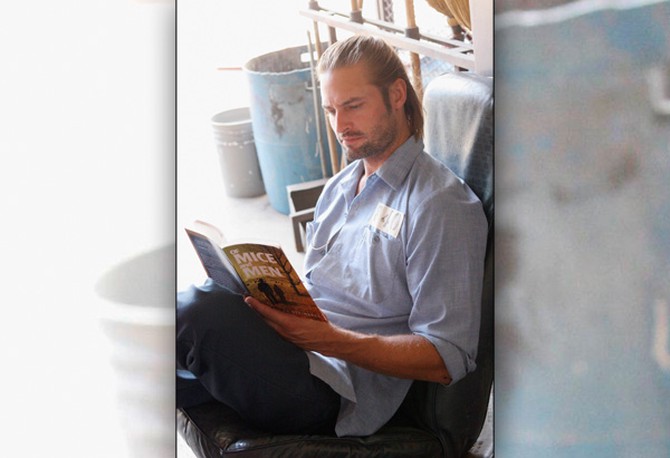
Of Mice and Men by John Steinbeck
Episode appearances:
Season 6, Episode 4: "The Substitute"
Season 3, Episode 4: "Every Man for Himself"
Of Mice and Men is a great American novel about love and loneliness, feeling displaced and rootless, and two friends who have nothing but each other. The book may also suggest that dreams are, quite often, ultimately futile.
The first time we see Sawyer reading John Steinbeck is in prison in Season 3, Episode 4, "Every Man for Himself." Then Sawyer cracks a joke that Ben, his captor, would like Of Mice and Men because a "puppy gets killed." Later, Ben shows his prowess by quoting a line Sawyer doesn't recognize: "A guy goes nuts if he ain't got nobody. It don't make any difference who the guy is, so long as he's with you. I tell ya, I tell ya, a guy gets too lonely, and he gets sick." The quotation is an interesting contrast to the episode title—and yet another reverberation of the show's "Live together, die alone" philosophy.
In Season 6, Episode 4, "The Substitute," we see Sawyer and Fake Smoke Monster Locke walking though the jungle. Sawyer asks: "My favorite Steinbeck—Of Mice and Men—you know that one?"
Fake Smoke Monster Locke: "Nope, a little after my time."
Sawyer: "It's about these two guys—George and Lenny. Lenny's kind of slow, causing George problems. So George walks him out in the woods and tells him to look out yonder and picture the pretty little house they're going to live in one day, and he shoots George in the back of the head."
Fake Smoke Monster Locke: "Well, that doesn't sound like a happy ending."
Sawyer: "It isn't."
Check out the complete works of author John Steinbeck
Season 6, Episode 4: "The Substitute"
Season 3, Episode 4: "Every Man for Himself"
Of Mice and Men is a great American novel about love and loneliness, feeling displaced and rootless, and two friends who have nothing but each other. The book may also suggest that dreams are, quite often, ultimately futile.
The first time we see Sawyer reading John Steinbeck is in prison in Season 3, Episode 4, "Every Man for Himself." Then Sawyer cracks a joke that Ben, his captor, would like Of Mice and Men because a "puppy gets killed." Later, Ben shows his prowess by quoting a line Sawyer doesn't recognize: "A guy goes nuts if he ain't got nobody. It don't make any difference who the guy is, so long as he's with you. I tell ya, I tell ya, a guy gets too lonely, and he gets sick." The quotation is an interesting contrast to the episode title—and yet another reverberation of the show's "Live together, die alone" philosophy.
In Season 6, Episode 4, "The Substitute," we see Sawyer and Fake Smoke Monster Locke walking though the jungle. Sawyer asks: "My favorite Steinbeck—Of Mice and Men—you know that one?"
Fake Smoke Monster Locke: "Nope, a little after my time."
Sawyer: "It's about these two guys—George and Lenny. Lenny's kind of slow, causing George problems. So George walks him out in the woods and tells him to look out yonder and picture the pretty little house they're going to live in one day, and he shoots George in the back of the head."
Fake Smoke Monster Locke: "Well, that doesn't sound like a happy ending."
Sawyer: "It isn't."
Check out the complete works of author John Steinbeck
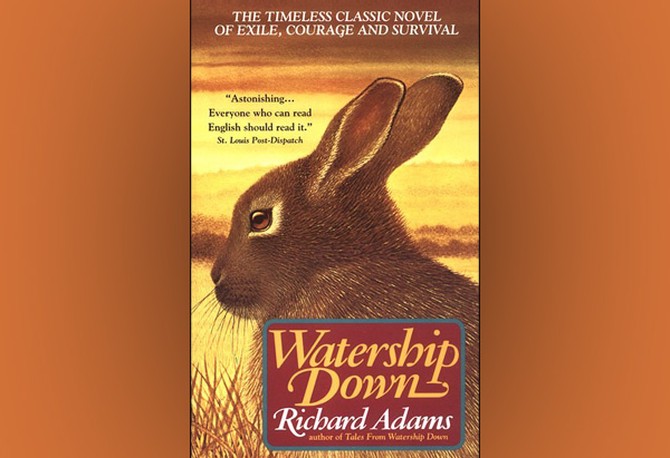
Watership Down by Richard Adams
Episode appearances:
Season 1, Episode 6: "House of the Rising Sun"
Season 1, Episode 8: "Confidence Man"
Season 3, Episode 15: "Left Behind"
Season 6, Episode 8: "Recon"
Billed as, "a timeless novel of exile, courage and survival," Watership Down by Richard Adams has made enough appearances in the past six seasons that one might argue it deserves an end credit. Lost and Watership Down both share the themes of exile, the search for home, a frightening smoke monster and the dominant idea that Jack proclaimed at the end of Season 2—"Live together, die alone."
We first see Sawyer reading Watership Down in Season 1, Episode 6, "House of the Rising Sun," when he chooses to stay at the beach instead of moving to the caves as Jack requests. In Season 1, Episode 8, "Confidence Man," Sawyer is accused of withholding Shannon's inhaler medicines and the book gives it credence, as it was in the same luggage. Sawyer says to Kate: "Helluva book. It's about bunnies."
The novel is seen again in Season 3, Episode 15, "Left Behind," when Hurley cons Sawyer into being nice to the other survivors by telling him that they will take a vote on whether or not he should be banished. Fast-forward to Season 6, and Watership Down is seen on Sawyer's dresser in his sideways reality. In the episode, Miles asks sideways Sawyer, "Do you want to die alone?"
Season 1, Episode 6: "House of the Rising Sun"
Season 1, Episode 8: "Confidence Man"
Season 3, Episode 15: "Left Behind"
Season 6, Episode 8: "Recon"
Billed as, "a timeless novel of exile, courage and survival," Watership Down by Richard Adams has made enough appearances in the past six seasons that one might argue it deserves an end credit. Lost and Watership Down both share the themes of exile, the search for home, a frightening smoke monster and the dominant idea that Jack proclaimed at the end of Season 2—"Live together, die alone."
We first see Sawyer reading Watership Down in Season 1, Episode 6, "House of the Rising Sun," when he chooses to stay at the beach instead of moving to the caves as Jack requests. In Season 1, Episode 8, "Confidence Man," Sawyer is accused of withholding Shannon's inhaler medicines and the book gives it credence, as it was in the same luggage. Sawyer says to Kate: "Helluva book. It's about bunnies."
The novel is seen again in Season 3, Episode 15, "Left Behind," when Hurley cons Sawyer into being nice to the other survivors by telling him that they will take a vote on whether or not he should be banished. Fast-forward to Season 6, and Watership Down is seen on Sawyer's dresser in his sideways reality. In the episode, Miles asks sideways Sawyer, "Do you want to die alone?"
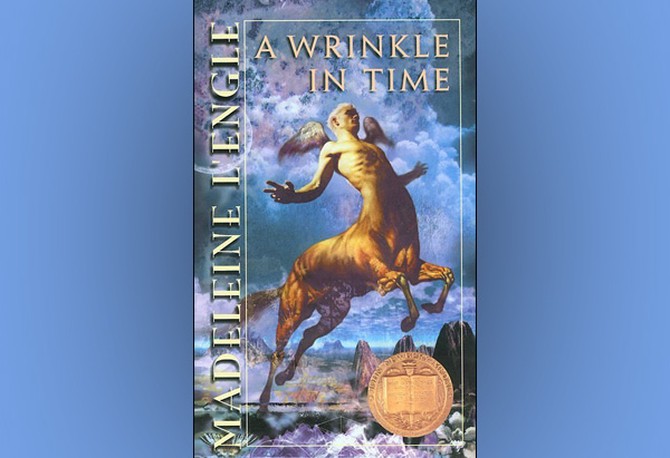
A Wrinkle in Time by Madeleine L'Engle
Episode appearances:
Season 6, Episode 8: "Recon"
Season 1, Episode 19: "Deus Ex Machina"
Season 1, Episode 18: "Numbers"
A combination of science fiction, romance and adventure, A Wrinkle in Time by Madeleine L'Engle is the story of a teenage time traveler who takes her brother and a friend with her to rescue her father, a scientist being held prisoner by an evil force. Lost and A Wrinkle in Time share overt themes about religion and faith, time and space travel with multiple dimensions and an evil force called The Black Smoke and The Black Thing respectively.
In Season 1, Episode 18, "Numbers," we find Sawyer reading A Wrinkle in Time on the beach. In the very next episode, Season 1, Episode 19: "Deus Ex Machina," he's on the beach reading the book when Jack offers to help him find some glasses for his "hyperopia" (farsightedness). Fast forward to Season 6, Episode 8, "Recon," Charlotte finds A Wrinkle in Time on Sawyer's dresser in his sideways reality.
If we aren't reading too much into it, consider this: In the book, Charles Wallace has psychic qualities. In the Lighthouse episode, number 108 on the lighthouse wheel is Wallace—one that Jacob hints is coming to the island. 108 is the sum of all the numbers and has great significance in Lost lore.
Read an excerpt from Madeleine L'Engle's book Camilla
Season 6, Episode 8: "Recon"
Season 1, Episode 19: "Deus Ex Machina"
Season 1, Episode 18: "Numbers"
A combination of science fiction, romance and adventure, A Wrinkle in Time by Madeleine L'Engle is the story of a teenage time traveler who takes her brother and a friend with her to rescue her father, a scientist being held prisoner by an evil force. Lost and A Wrinkle in Time share overt themes about religion and faith, time and space travel with multiple dimensions and an evil force called The Black Smoke and The Black Thing respectively.
In Season 1, Episode 18, "Numbers," we find Sawyer reading A Wrinkle in Time on the beach. In the very next episode, Season 1, Episode 19: "Deus Ex Machina," he's on the beach reading the book when Jack offers to help him find some glasses for his "hyperopia" (farsightedness). Fast forward to Season 6, Episode 8, "Recon," Charlotte finds A Wrinkle in Time on Sawyer's dresser in his sideways reality.
If we aren't reading too much into it, consider this: In the book, Charles Wallace has psychic qualities. In the Lighthouse episode, number 108 on the lighthouse wheel is Wallace—one that Jacob hints is coming to the island. 108 is the sum of all the numbers and has great significance in Lost lore.
Read an excerpt from Madeleine L'Engle's book Camilla
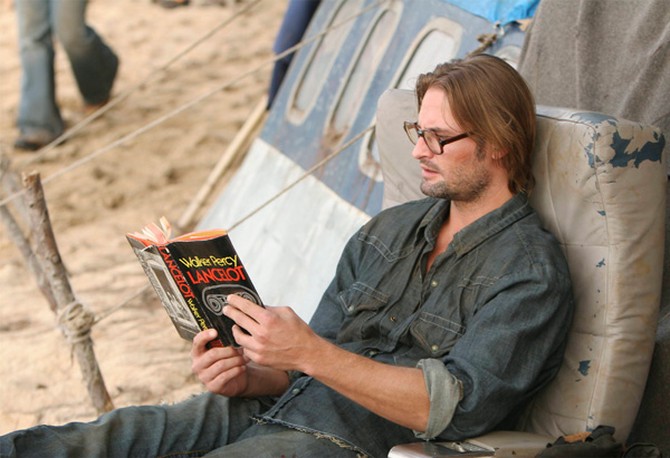
Lancelot by Walker Percy
Episode appearances:
Season 6, Episode 8: "Recon"
Season 2, Episode 15: "Maternity Leave"
In Season 2, Episode 15, "Maternity Leave," Sawyer is reading Lancelot by Walker Percy as Kate comes to borrow a gun from him. From a hospital bed, Lancelot's title character tells the story of the rage and jealousy that led him to kill his unfaithful wife by blowing up their house. The book culminates with Lancelot recounting how he set the fire to kill his cheating wife and her new lover, Jacoby (Jacob, perhaps?). Lancelot ends up in a mental institution haunted by memories that blur the lines between reality and the past. Lancelot alludes directly to Kate's story as seen in "What Kate Did"—she murders her father by blowing up the house where he is sleeping. It also brings to mind Sawyer's storyline—his father killed his mother and then himself.
Lancelot blurs the lines between sanity and madness—as well as the morality of our decisions and emotions. As Lancelot Lamar says to his friend Percival, "You must decide...for yourself."
Season 6, Episode 8: "Recon"
Season 2, Episode 15: "Maternity Leave"
In Season 2, Episode 15, "Maternity Leave," Sawyer is reading Lancelot by Walker Percy as Kate comes to borrow a gun from him. From a hospital bed, Lancelot's title character tells the story of the rage and jealousy that led him to kill his unfaithful wife by blowing up their house. The book culminates with Lancelot recounting how he set the fire to kill his cheating wife and her new lover, Jacoby (Jacob, perhaps?). Lancelot ends up in a mental institution haunted by memories that blur the lines between reality and the past. Lancelot alludes directly to Kate's story as seen in "What Kate Did"—she murders her father by blowing up the house where he is sleeping. It also brings to mind Sawyer's storyline—his father killed his mother and then himself.
Lancelot blurs the lines between sanity and madness—as well as the morality of our decisions and emotions. As Lancelot Lamar says to his friend Percival, "You must decide...for yourself."
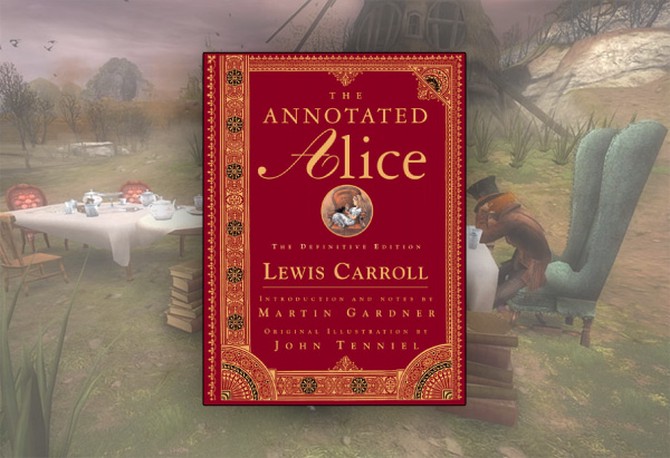
Alice in Wonderland by Lewis Carroll
Episode appearances:
Season 6, Episode 5: "Lighthouse"
Season 4, Episode 10: "Something Nice Back Home"
Season 3, Episode 22: "Through the Looking Glass, Part 1"
Season 3, Episode 20: "Man Behind the Curtain"
Season 1, Episode 5: "White Rabbit"
Lost is littered with allusions to Lewis Carroll's Alice in Wonderland. In Season 1, Episode 5, "White Rabbit," John Locke compares Jack Shepard's "hallucination" of his father to the White Rabbit from Alice in Wonderland, saying that everything on the island might be happening for a reason. Their conversation illuminates one of the pair's core conflicts: faith versus reason. It's also the episode where Jack becomes the leader of the survivors.
In Season 3, Episode 20, "Man Behind the Curtain," a young Ben Linus follows a white rabbit through a fence, effectively leaving behind what he knows. The two-part Season 3 finale title, "Through the Looking Glass," also references Carroll's Alice in Wonderland sequel and the underwater Dharma Initiative station that claims Charlie's life. The symbol of the Looking Glass station is a (wait for it) white rabbit. In Season 4, Episode 10, "Something Nice Back Home," we see a tender moment between Jack and Aaron, his would-be adopted son, as they read Alice in Wonderland before bed.
Fast-forward to the Season 6, Episode 5, "Lighthouse," where in Jack's sideways reality, his teenage son David is reading Alice in Wonderland. Jack makes reference to Alice's two kittens, Kitty and Snowdrop—another good versus evil parallel. In the episode, Jack also finds a key to his ex-wife's house hidden under a rabbit statue. In the island reality, the temple leader Dogen talks about cutting off Hurley's head, just like the Queen of Hearts. And in the lighthouse, both Hurley Reyes and Jack go through the looking glass via the lighthouse mirrors that show glimpses into other worlds.
Read about Tim Burton's new movie version of Alice in Wonderland
Season 6, Episode 5: "Lighthouse"
Season 4, Episode 10: "Something Nice Back Home"
Season 3, Episode 22: "Through the Looking Glass, Part 1"
Season 3, Episode 20: "Man Behind the Curtain"
Season 1, Episode 5: "White Rabbit"
Lost is littered with allusions to Lewis Carroll's Alice in Wonderland. In Season 1, Episode 5, "White Rabbit," John Locke compares Jack Shepard's "hallucination" of his father to the White Rabbit from Alice in Wonderland, saying that everything on the island might be happening for a reason. Their conversation illuminates one of the pair's core conflicts: faith versus reason. It's also the episode where Jack becomes the leader of the survivors.
In Season 3, Episode 20, "Man Behind the Curtain," a young Ben Linus follows a white rabbit through a fence, effectively leaving behind what he knows. The two-part Season 3 finale title, "Through the Looking Glass," also references Carroll's Alice in Wonderland sequel and the underwater Dharma Initiative station that claims Charlie's life. The symbol of the Looking Glass station is a (wait for it) white rabbit. In Season 4, Episode 10, "Something Nice Back Home," we see a tender moment between Jack and Aaron, his would-be adopted son, as they read Alice in Wonderland before bed.
Fast-forward to the Season 6, Episode 5, "Lighthouse," where in Jack's sideways reality, his teenage son David is reading Alice in Wonderland. Jack makes reference to Alice's two kittens, Kitty and Snowdrop—another good versus evil parallel. In the episode, Jack also finds a key to his ex-wife's house hidden under a rabbit statue. In the island reality, the temple leader Dogen talks about cutting off Hurley's head, just like the Queen of Hearts. And in the lighthouse, both Hurley Reyes and Jack go through the looking glass via the lighthouse mirrors that show glimpses into other worlds.
Read about Tim Burton's new movie version of Alice in Wonderland
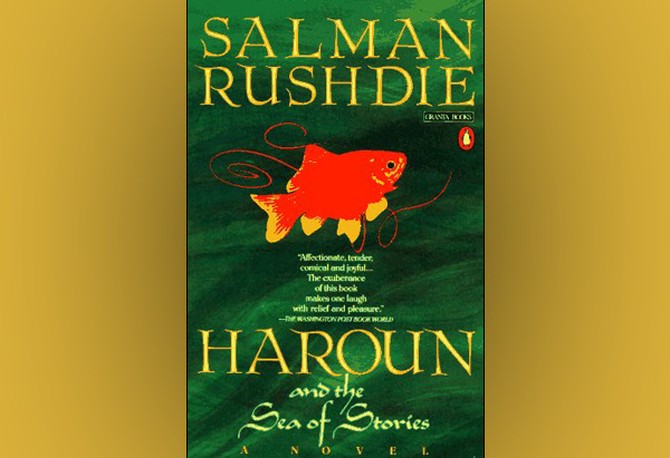
Haroun and the Sea of Stories by Salman Rushdie
Episode appearances:
Season 6, Episode 1: LAX (Parts 1 & 2)
Haroun and the Sea of Stories by Salman Rushdie appears only briefly in the Season 6 opener, "LAX." Desmond is reading this book on the flight in the sideways reality. One of our many questions: Why is Desmond on the flight? But as for the book, it is the story of a young, curious, courageous, outspoken child who suffers from a disorder that causes him to lose concentration after 11 minutes. His father, a master storyteller, travels in his dreams and wakes to a city so old that no one can remember its name.
Elements of the story are said to have been drawn from L. Frank Baum's The Wizard of Oz, J.R.R. Tolkien's The Lord of the Rings and Lewis Carroll's Alice in Wonderland, dealing with the now-familiar Lost themes of light versus darkness, good versus evil, and speech versus silence.
Season 6, Episode 1: LAX (Parts 1 & 2)
Haroun and the Sea of Stories by Salman Rushdie appears only briefly in the Season 6 opener, "LAX." Desmond is reading this book on the flight in the sideways reality. One of our many questions: Why is Desmond on the flight? But as for the book, it is the story of a young, curious, courageous, outspoken child who suffers from a disorder that causes him to lose concentration after 11 minutes. His father, a master storyteller, travels in his dreams and wakes to a city so old that no one can remember its name.
Elements of the story are said to have been drawn from L. Frank Baum's The Wizard of Oz, J.R.R. Tolkien's The Lord of the Rings and Lewis Carroll's Alice in Wonderland, dealing with the now-familiar Lost themes of light versus darkness, good versus evil, and speech versus silence.
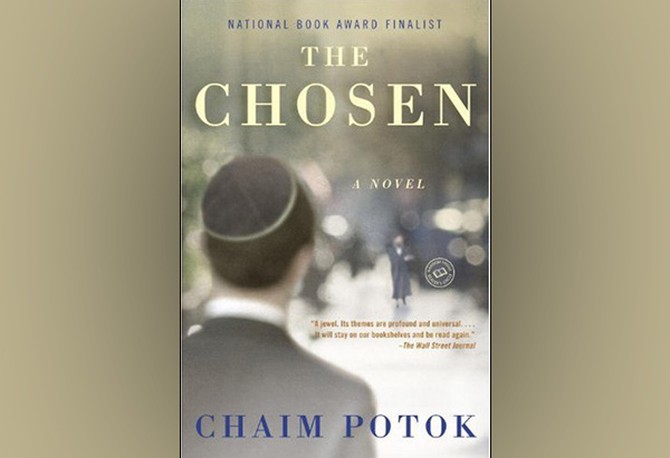
The Chosen by Chaim Potok
Episode appearances:
Season 6, Episode 7: "Dr. Linus"
One of the fascinating things about Chaim Potok's The Chosen is that there is symbolism in the 18 chapters divided into three sections. In the Jewish culture, 18 is a lucky number because it represents life.Jacob also has a thing for numbers—yet in the Season 6, Episode 5, "Lighthouse," the lighthouse dial read, "18 Kueffner,"— but the name was already crossed out.
The Chosen is the story of two young boys from different worlds who form an unlikely friendship—perhaps Ben Linus and Jacob? The story centers on the idea that people are defined by their choices. Though the boys in the story are 15 years old, Ben was just 12 when he chose to leave the Dharma Initiative to be with the Others. In the Season 6, Episode 7, "Dr. Linus," he must face the consequences of killing Jacob. Plus, the story takes place over a six-year time span—similar to the six seasons of Lost.
Season 6, Episode 7: "Dr. Linus"
One of the fascinating things about Chaim Potok's The Chosen is that there is symbolism in the 18 chapters divided into three sections. In the Jewish culture, 18 is a lucky number because it represents life.Jacob also has a thing for numbers—yet in the Season 6, Episode 5, "Lighthouse," the lighthouse dial read, "18 Kueffner,"— but the name was already crossed out.
The Chosen is the story of two young boys from different worlds who form an unlikely friendship—perhaps Ben Linus and Jacob? The story centers on the idea that people are defined by their choices. Though the boys in the story are 15 years old, Ben was just 12 when he chose to leave the Dharma Initiative to be with the Others. In the Season 6, Episode 7, "Dr. Linus," he must face the consequences of killing Jacob. Plus, the story takes place over a six-year time span—similar to the six seasons of Lost.

Fear and Trembling by Søren Kierkegaard
Episode appearances:
Season 6, Episode 1: LAX (Parts 1 & 2)
Fear and Trembling by Søren Kierkegaard is found at the entrance to the temple where Montand from Rousseau's team was killed by the Smoke Monster. When they return to the temple in Part 2 of the Season 6 opener, they come across Montand's remains and his backpack. "Who brings a book into a cave?" Hurley asks.
With a title that references Philippians 2:12—"Continue to work out your salvation with fear and trembling"—Fear and Trembling discusses fundamental issues in moral philosophy. Kierkegaard acts as a defense attorney for Abraham in an interpretation of the Biblical tale where Abraham is asked to sacrifice his son Isaac to prove his devotion. Its dominant themes are tests of faith, the ethics of choice and faith's relationship with ethics and morality. It concludes that faith is admirable but Abraham's willingness to kill his son remains incomprehensible—that his faith finds its foundation in an absurd belief.
Is this a commentary on the roles that faith and choice have played between Ben Linus and Jacob? Consider that Ben killed John Locke, which enabled him to get back to the island but also gave the Man In Black room to move—who turned right around and killed Jacob with Ben's help. Was it the right choice?
Season 6, Episode 1: LAX (Parts 1 & 2)
Fear and Trembling by Søren Kierkegaard is found at the entrance to the temple where Montand from Rousseau's team was killed by the Smoke Monster. When they return to the temple in Part 2 of the Season 6 opener, they come across Montand's remains and his backpack. "Who brings a book into a cave?" Hurley asks.
With a title that references Philippians 2:12—"Continue to work out your salvation with fear and trembling"—Fear and Trembling discusses fundamental issues in moral philosophy. Kierkegaard acts as a defense attorney for Abraham in an interpretation of the Biblical tale where Abraham is asked to sacrifice his son Isaac to prove his devotion. Its dominant themes are tests of faith, the ethics of choice and faith's relationship with ethics and morality. It concludes that faith is admirable but Abraham's willingness to kill his son remains incomprehensible—that his faith finds its foundation in an absurd belief.
Is this a commentary on the roles that faith and choice have played between Ben Linus and Jacob? Consider that Ben killed John Locke, which enabled him to get back to the island but also gave the Man In Black room to move—who turned right around and killed Jacob with Ben's help. Was it the right choice?
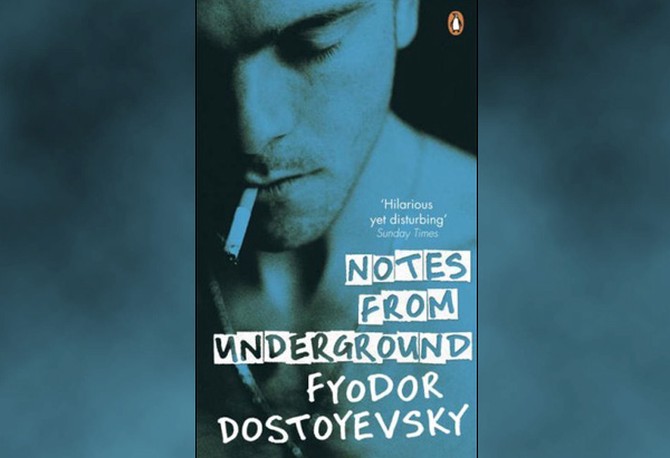
Notes from Underground by Fyodor Dostoevsky
Season 6, Episode 12: Everybody Loves Hugo
After Ilana's death, Hurley finds a Russian-language copy of Fyodor Dostoyevsky's 1864 novel Notes from Underground in her things. (Was Ilana studying up on her enemy?) Hurley also finds a pouch that may contain either some of Jacob's ashes, or the black and white stones—which seem to represent light and dark, or good and evil.
Presenting several Lost themes such as the relationship between the individual and society, definitions of truth or reality, determinism versus free will and the meaning of morality, Notes from Underground is a rejection of socialist utopianism. It highlights the idea that anyone at any time can act in a way which may or may not be considered "good"—since good is a subjective, relative term. (For example, was Hurley's decision to blow up the leftover Black Rock dynamite good?) A primer of existential thought, the book is said to have inspired philosophers like Jean Paul Sartre, Friedrich Nietzche, as well as writers such as Leo Tolstoy, Ralph Ellison, Joseph Heller, Richard Wright and Bret Easton Ellis.
After Ilana's death, Hurley finds a Russian-language copy of Fyodor Dostoyevsky's 1864 novel Notes from Underground in her things. (Was Ilana studying up on her enemy?) Hurley also finds a pouch that may contain either some of Jacob's ashes, or the black and white stones—which seem to represent light and dark, or good and evil.
Presenting several Lost themes such as the relationship between the individual and society, definitions of truth or reality, determinism versus free will and the meaning of morality, Notes from Underground is a rejection of socialist utopianism. It highlights the idea that anyone at any time can act in a way which may or may not be considered "good"—since good is a subjective, relative term. (For example, was Hurley's decision to blow up the leftover Black Rock dynamite good?) A primer of existential thought, the book is said to have inspired philosophers like Jean Paul Sartre, Friedrich Nietzche, as well as writers such as Leo Tolstoy, Ralph Ellison, Joseph Heller, Richard Wright and Bret Easton Ellis.
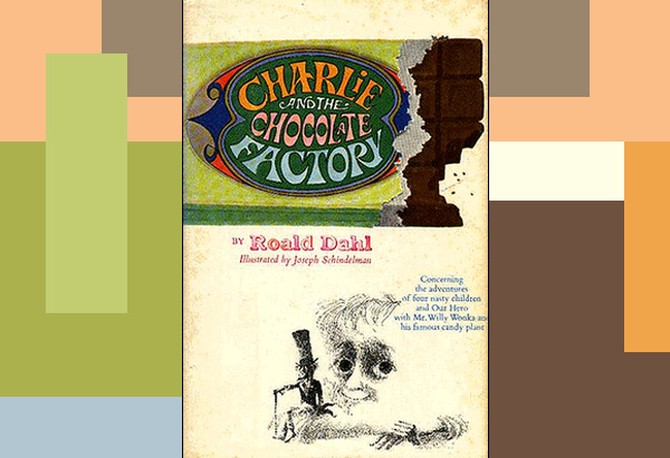
Charlie and the Chocolate Factory by Roald Dahl
Episode appearance:
Teaser at the end of Season 6, Episode 12: Everybody Loves Hugo
You might have missed this, but the promo for Episode 13: The Recruit uses "The Rowing Song" from the 1971 movie version of Charlie and the Chocolate Factory entitled Willy Wonka & the Chocolate Factory. The story resonates with Lost—a man on a quest to find an heir leads a group of golden ticket–winning candidates on a mystical, confusing and amazing journey.
In the movie, the song plays when the candidates take a horrifying ride on Willy Wonka's boat. By the end of the trip, most of the candidates are undone by their own character flaws, yet Charlie Bucket wins the contest (though he did not know it was a contest at all) because he's good at heart and honest.
Here are the lyrics from "The Rowing Song":
Round the world and home again
That's the sailor's way
Faster faster, faster, faster
There's no earthly way of knowing
Which direction we are going
There's no knowing where we're rowing
Or which way the river's flowing
Is it raining, is it snowing
Is a hurricane a-blowing
Not a speck of light is showing
So the danger must be growing
Are the fires of Hell a-glowing
Is the grisly reaper mowing
Yes, the danger must be growing
For the rowers keep on rowing
And they're certainly not showing
Any signs that they are slowing
What do you think of this bookshelf so far? Leave your thoughts below!
Keep Reading
Teaser at the end of Season 6, Episode 12: Everybody Loves Hugo
You might have missed this, but the promo for Episode 13: The Recruit uses "The Rowing Song" from the 1971 movie version of Charlie and the Chocolate Factory entitled Willy Wonka & the Chocolate Factory. The story resonates with Lost—a man on a quest to find an heir leads a group of golden ticket–winning candidates on a mystical, confusing and amazing journey.
In the movie, the song plays when the candidates take a horrifying ride on Willy Wonka's boat. By the end of the trip, most of the candidates are undone by their own character flaws, yet Charlie Bucket wins the contest (though he did not know it was a contest at all) because he's good at heart and honest.
Here are the lyrics from "The Rowing Song":
Round the world and home again
That's the sailor's way
Faster faster, faster, faster
There's no earthly way of knowing
Which direction we are going
There's no knowing where we're rowing
Or which way the river's flowing
Is it raining, is it snowing
Is a hurricane a-blowing
Not a speck of light is showing
So the danger must be growing
Are the fires of Hell a-glowing
Is the grisly reaper mowing
Yes, the danger must be growing
For the rowers keep on rowing
And they're certainly not showing
Any signs that they are slowing
What do you think of this bookshelf so far? Leave your thoughts below!
Keep Reading
Published 03/24/2010

